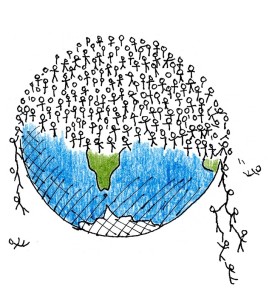The Myth of Overpopulation
 Australia recently welcomed its 23 millionth citizen. Of course we do not know who this person is exactly but they are out there somewhere. The person may have been a new born baby or possibly an immigrant who relocated to call Australia home. The news reports generally seemed to have been positive, or at least neutral, about our growing population numbers, which are still rather small compared to other nations. The same positivity was certainly not present when the global population ticked over to seven billion in early 2012. At that time there were renewed warnings from some quarters that earth could no longer continue with so many humans moving in.
Australia recently welcomed its 23 millionth citizen. Of course we do not know who this person is exactly but they are out there somewhere. The person may have been a new born baby or possibly an immigrant who relocated to call Australia home. The news reports generally seemed to have been positive, or at least neutral, about our growing population numbers, which are still rather small compared to other nations. The same positivity was certainly not present when the global population ticked over to seven billion in early 2012. At that time there were renewed warnings from some quarters that earth could no longer continue with so many humans moving in.
Talk of overpopulation is nothing new. One of the foundational works on the subject was published in 1798 by an English Vicar named Thomas Malthus. Malthus believed that unchecked population growth would lead to a reduced standard of living and he actually advocated the death of poorer members of society so that those of a higher social status would not starve. Malthus predicted that society was about to reach a point where the planet would no longer be able to produce enough food causing worldwide starvation. Although his predictions of a global meltdown never came true, Malthus is still cited as an authoritative reference for those who advocate the forced curbing of population growth.
What Malthus could not have envisaged was the way that the industrial revolution would so impact the ability of man to produce food. Both of the world’s leading authorities on food distribution today are very clear that there is enough food for everyone on the planet. The United Nations Food and Agricultural Organisation states the problem quite simply, “the world currently produces enough food for everybody, but many people do not have access to it”. In other words poverty stemming from a lack of food should not exist. Thanks to modern methods of farming, the world is producing hundreds of millions of tonnes more food each year on less land than was used thirty years ago. Just because the world has a greed and distribution problem though does not mean that the world has a population problem.
If we actually do some simple math on the question of population it may surprise you to know that the entire population of the planet could fit into the state of Queensland with plenty of room. Queensland is approximately 1.7 million square kilometres, or 1700 billion square metres. If this figure is divided by the current population of 7.1 billion every individual person would have 239 square metres for themselves. And if we further acknowledge that many of these people would live as families in common houses, there would be enough space for everyone to live comfortably in a full sized house with a large backyard. Now of course if that was to happen the state of Queensland would require much new infrastructure but the point of the example is that there is plenty of room on planet earth for all of us and more. It is true that our cities are overcrowded but that is because humans are of their nature communal beings. We like living in close proximity to others so the fact that the main roads are crowded each morning does not mean that forcing families to have less children will solve the problem. More likely, cities will always be congested and there will be a greater need for government to support the growth of new regional centres.
The reality is that more serious than any overpopulation problem is the global shrinking birth rate. To simply replace ourselves each childbearing woman must have 2.1 children however as of 2010 about 48% of the world’s nations have sub-replacement fertility levels. Virtually every European nation as well as Japan, Russia and Australia are not having enough children to replace their ageing populations. Some countries are now seeing the need to pay subsidies to couples who have more than two children.
It is wrong to think that people only consume resources and destroy nature. People are the world’s greatest asset because each new life offers a potential creativity and giftedness that did not exist before. More people do not equal greater poverty, on the contrary, it is the enlarging of community and the building up of nations that offer the greatest opportunities for people to live happy and successful lives. Overpopulation has always been, and remains, a myth perpetuated by ignorance, greed and fear.


